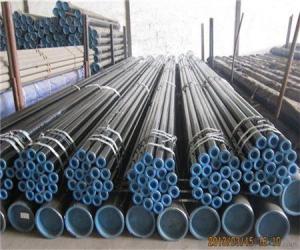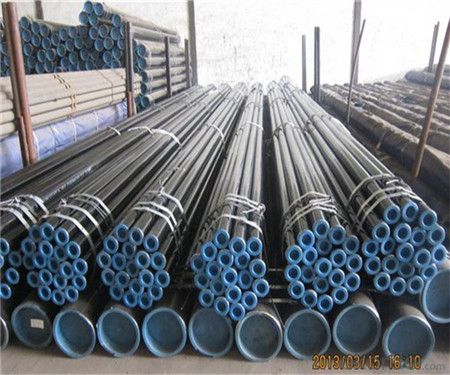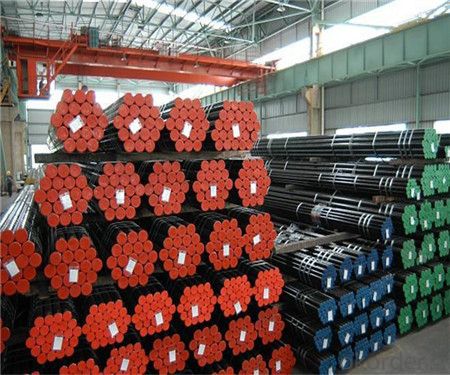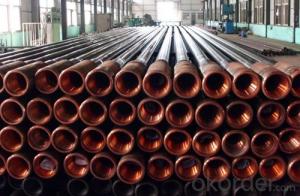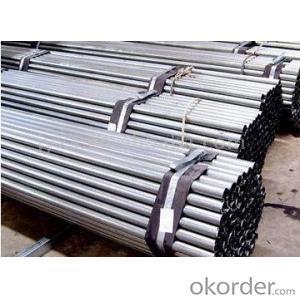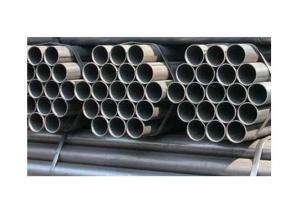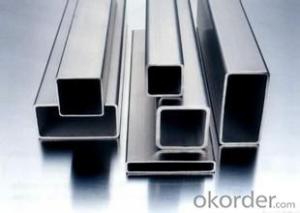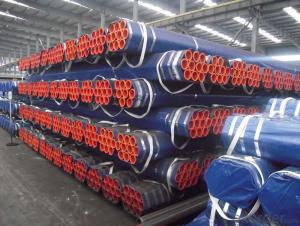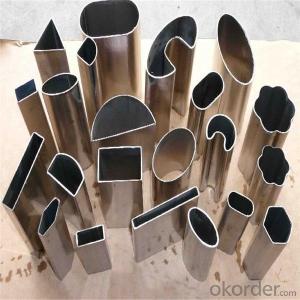China Seamless Steel Pipe/Tube Tubing and Casing Pipe Factory
- Loading Port:
- Tianjin
- Payment Terms:
- TT OR LC
- Min Order Qty:
- 20 m.t.
- Supply Capability:
- 12000 m.t./month
OKorder Service Pledge
OKorder Financial Service
You Might Also Like
Product Description:
▲ Line pipe
▲ Tubing and casing
▲ L & M & H boiler tube
▲ Gas cylinder tube & pipe
▲ Mechanical & Structural pipe
▲ Ship-building tube & pipe
▲ Automobile tube & pipe
TUBING AND CASING PIPE
Standard: APL SPEC 5CT
● Application:
Tubing is used to extracting extract petroleum and
natural gas from a well.
Casing serves as walls of well.
2、Main Features of the Seamless Pipe :
• High manufacturing accuracy
• The higher strength
• The small inertia resistance
• Strong heat dissipation ability
• Good visual effect
• Satisfy price
3、Seamless Pipe ASTM DIN1829 Specification:
Standard | GB, DIN, ASTM ASTM A106-2006, ASTM A53-2007 |
Grade | 10#-45#, 16Mn 10#, 20#, 45#, 16Mn |
Thickness | 8 - 33 mm |
Section Shape | Round |
Outer Diameter | 133 - 219 mm |
Place of Origin | Shandong, China (Mainland) |
Secondary Or Not | Non-secondary |
Application | Hydraulic Pipe |
Technique | Cold Drawn |
Certification | API |
Surface Treatment | factory state or painted black |
Special Pipe | API Pipe |
Alloy Or Not | Non-alloy |
Length | 5-12M |
Outer Diameter | 21.3-610mm |
Grade | 20#, 45#, Q345, API J55, API K55, API L80, API N80, API P110, A53B |
Standard | ASME, ASTM |
1) Material:20#(ASTM A 106/A53 GRB.API5LGRB,GB),45#,16Mn,10#.
2) Specification range:OD:21.3-610mm,WT:6-70mm,length:6-12m or according to the requirement of clients.
3) Excutive standards:GB,ASME API5L.ASTM A 106/A53,Despite of the above standards,we can also supply seamless steel pipe with standard of DIN,JIS,and so on,and also develop new products according to the requirements of our clients!
4) Surface:black lacquered,varnish coating or galvanized.
5) Ends:Beveled or square cut,plastic capped,painted.
6) Packing:bundles wrapped with strong steel strip,seaworthy packing.
4、Packaging & Delivery
Packaging Details: | seaworthy package,bundles wrapped with strong steel strip |
Delivery Detail: | 15-30days after received 30%TT |
5、FAQ of Seamless Pipe ASTM DIN1829:
①How is the quality of your products?
We have many years business experience in this area, and we have professional engineer and manager team and sure we can provide you high quality production and professional service.
②How about price?
Yes, we are factory and be able to give you lowest price below market one, and we have a policy that “ for saving time and absolutely honest business attitude, we quote as lowest as possible for any customer, and discount can be given according to quantity”,if you like bargain and factory price is not low enough as you think, just don’t waste your time.Please trust the quotation we would give you, it is professional one.
③Why should you chose us?
We can give you both.Additionally, we can also offer professional products inquiry, products knowledge train(for agents), smooth goods delivery, exellent customer solution proposals.Our service formula: good quality+good price+good service=customer’s trust
SGS test is available, customer inspection before shipping is welcome, third party inspection is no problem
our advantage:
Professional teams ensure a high efficiency of your purchase
▲ Professional sales team
▲ Professional engineering and technology team
▲ Professional exportation and contract processing/management team
▲ Professional cooperators and partners
6、Seamless Pipe Images:
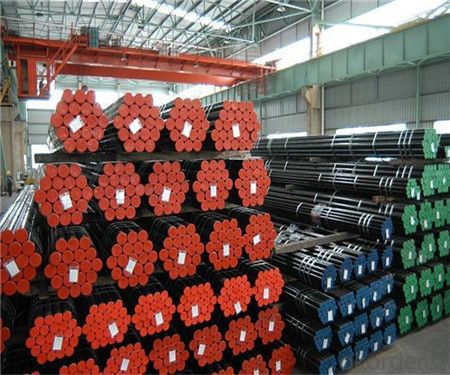
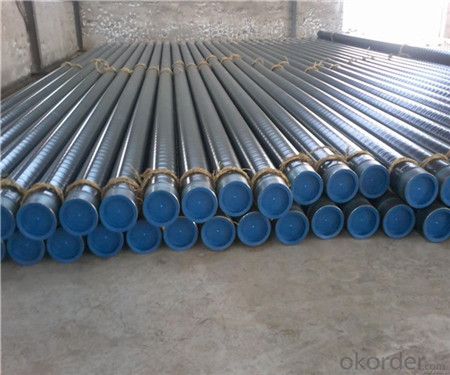
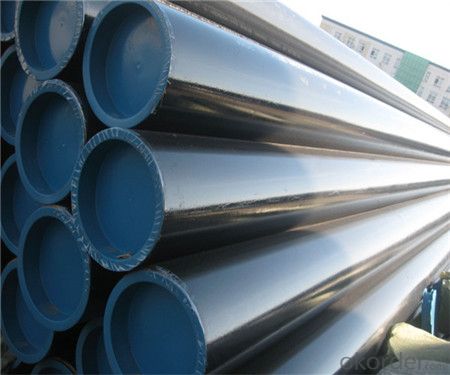
- Q: What is the difference between carbon steel pipes and stainless steel pipes?
- The main difference between carbon steel pipes and stainless steel pipes lies in their composition and properties. Carbon steel pipes are primarily made of iron and carbon, with small amounts of other elements. They are less expensive, have higher tensile strength, and are suitable for transporting fluids and gases in various industries. On the other hand, stainless steel pipes contain iron, chromium, and other alloying elements. They are more expensive, have higher corrosion resistance, and are commonly used in applications where hygiene, durability, and aesthetic appeal are essential, such as in the food, pharmaceutical, and architectural industries.
- Q: Can steel pipes be recycled?
- Yes, steel pipes can be recycled. Steel is a highly recyclable material and can be used to create new steel products, including pipes, through processes like melting and reshaping. This helps to conserve natural resources, reduce energy consumption, and minimize waste.
- Q: What time what time for gas pipeline steel pipe PE pipe
- PE pipe must be installed underground, the steel tube can be exposed, when not all PE pipe for pipe laying, overhead installation. But the steel tube is easy to rust, so it can be used where the basic use of PE pipe buried PE pipe.There are galvanized steel pipe and seamless steel pipe, galvanized pipe can only be used for low-pressure homes
- Q: How are steel pipes used in the manufacturing of conveyor systems?
- Steel pipes are commonly used in the manufacturing of conveyor systems to provide a durable and reliable structure for transporting various materials. They are typically used as the main framework for the conveyor system, supporting the conveyor belt and other components. Steel pipes are known for their strength and resistance to wear and tear, making them ideal for handling heavy loads and withstanding continuous use. Additionally, steel pipes can be easily shaped and welded, allowing for customization and flexibility in conveyor system design.
- Q: Can steel pipes be used for plumbing?
- Yes, steel pipes can be used for plumbing. Steel pipes are commonly used for plumbing applications due to their strength, durability, and resistance to corrosion. However, other materials such as copper and PVC are also commonly used depending on the specific requirements and preferences of the plumbing system.
- Q: What are the factors to consider when designing a steel pipe system?
- When designing a steel pipe system, several factors need to be considered. Firstly, the intended purpose of the system and the materials that will be transported through it are crucial. This determines the required pipe diameter, thickness, and material type to ensure compatibility and prevent corrosion or leakage. Secondly, the operating conditions, such as temperature, pressure, and flow rate, must be examined to select pipes with suitable strength and resistance properties. Additionally, factors like environmental conditions, including soil characteristics and exposure to chemicals or natural elements, should be evaluated to determine the necessary protective coatings or insulation. Lastly, considerations like installation requirements, regulatory compliance, and maintenance accessibility should be taken into account to design a practical and efficient steel pipe system.
- Q: How are steel pipes used in irrigation systems?
- Steel pipes are commonly used in irrigation systems to transport water from a water source, such as a well or reservoir, to the fields or crops that need to be irrigated. These pipes are durable, strong, and resistant to weathering and corrosion, making them ideal for outdoor use. They can be laid underground or above ground, and their flexibility allows for easy installation and maintenance. Steel pipes in irrigation systems ensure a reliable and efficient water supply to promote healthy plant growth and maximize crop yields.
- Q: How are steel pipes used in the construction of oil-fired power plants?
- Steel pipes are primarily used in the construction of oil-fired power plants for transporting oil and gas, as well as for the construction of boilers and other high-pressure equipment. These pipes are durable, resistant to corrosion, and can withstand high temperatures and pressures, making them suitable for the harsh conditions and demands of power plant operations.
- Q: Are steel pipes suitable for underground nuclear waste storage?
- Steel pipes are not suitable for underground nuclear waste storage. While steel is a strong and durable material, it is not resistant to corrosion when exposed to certain types of nuclear waste. Over time, the radioactive materials can corrode the steel pipes, leading to potential leaks and contaminating the surrounding environment. Additionally, steel pipes are not designed to withstand the extreme temperatures and pressures that can occur in nuclear waste storage facilities. Therefore, alternative materials such as corrosion-resistant alloys or concrete are typically used for underground nuclear waste storage to ensure the containment and isolation of the hazardous materials.
- Q: What is the difference between steel pipes and fiberglass-reinforced pipes?
- The main difference between steel pipes and fiberglass-reinforced pipes lies in their composition and structural characteristics. Steel pipes are made of a durable metal alloy, typically carbon steel, which provides strength and resistance to high pressure and temperature. On the other hand, fiberglass-reinforced pipes are composed of a plastic matrix reinforced with glass fibers, making them lightweight, corrosion-resistant, and suitable for various applications. While steel pipes are commonly used in industrial settings, fiberglass-reinforced pipes are often utilized in sectors requiring corrosion resistance, such as chemical processing, wastewater treatment, and oil and gas industries.
Send your message to us
China Seamless Steel Pipe/Tube Tubing and Casing Pipe Factory
- Loading Port:
- Tianjin
- Payment Terms:
- TT OR LC
- Min Order Qty:
- 20 m.t.
- Supply Capability:
- 12000 m.t./month
OKorder Service Pledge
OKorder Financial Service
Similar products
Hot products
Hot Searches
Related keywords
